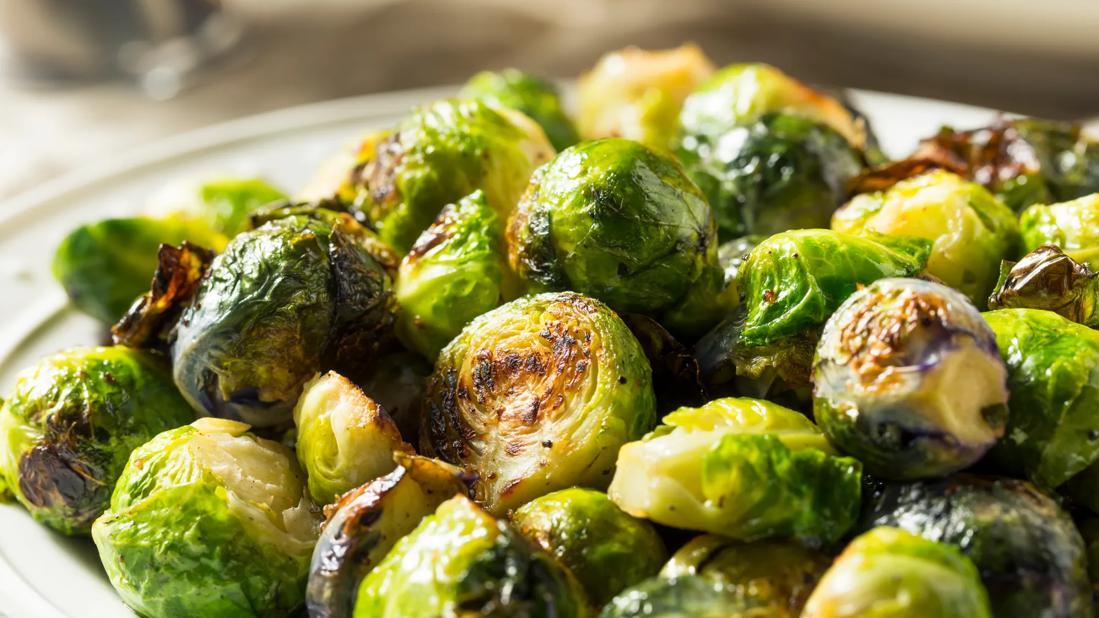They may not be your favorite veggie, but they’re packed with disease-fighting nutrients and tasty when roasted

Image content: This image is available to view online.
View image online (https://assets.clevelandclinic.org/transform/6394ade2-a4a6-46b8-a000-e21d416f63af/brussel-sprouts-1056918140)
Plate of roasted Brussels sprouts
You may not have the best memories of eating Brussels sprouts when you were younger. But the mini cabbage-like veggies are worth a bite because they’re packed with nutrients like vitamin K and vitamin C — and they’re low in calories.
Advertisement
Cleveland Clinic is a non-profit academic medical center. Advertising on our site helps support our mission. We do not endorse non-Cleveland Clinic products or services. Policy
“From a nutrition standpoint, Brussels sprouts are exceptionally healthy, like all cruciferous vegetables,” says registered dietitian Michelle Dodd, RD, LD. “And they can be delicious, depending on how you prepare them.”
A member of the cruciferous family of veggies, Brussels sprouts get their name from Brussels, Belgium. They’re low in calories and fat and offer fiber and several key vitamins and minerals.
Half a cup of cooked Brussels sprouts contains:
Half a cup of Brussels sprouts also provides:
“Brussels sprouts are a superfood because of all the nutrients they provide,” says Dodd. “Beyond some of the usual minerals and vitamins, they offer unique health-boosting phytonutrients. These phytonutrients are one of the reasons cruciferous vegetables like Brussels sprouts are so nutritious.”
When part of a healthy diet, Brussels sprouts offer many potential health benefits:
When it comes to vitamin C content, Brussels sprouts rival oranges. Vitamin C, a potent antioxidant, may benefit your health in several ways:
Advertisement
In addition to vitamin C, Brussels sprouts contain other key antioxidants:
“Healthy digestion isn’t just about staying regular or avoiding stomachaches,” says Dodd. “Your gut also affects your mood, helps your immune system and enables you to get rid of toxins, among many other functions.”
Fiber is critical for gut health, and most of us aren’t getting anywhere near the recommended 25 to 30 grams daily. One-half cup of cooked Brussels sprouts provides 2 grams of fiber.
Heart disease includes several conditions that affect your heart and cardiovascular system.
“Most of the major causes of heart disease are lifestyle-related, which means they’re mostly in your control,” notes Dodd. “It’s never too early to think about heart health, and your food choices play a major role in preventing heart disease.”
Dodd says Brussels sprouts are an excellent addition to a heart-healthy diet because they provide:
“Type 2 diabetes affects about 1 in 10 people in the U.S.,” reports Dodd. “Diet plays a huge role in the onset of diabetes, and eating the right foods can help delay or prevent this condition.”
Veggies can help keep your blood sugar steady. Research shows that eating more cruciferous vegetables, such as Brussels sprouts, protects against Type 2 diabetes.
In a review of several studies, investigators found that the alpha-lipoic acid in Brussels sprouts may improve blood sugar control and prevent nerve complications in people with Type 2 diabetes.
Inflammation is a normal and necessary process when your body is fighting an infection or healing from an injury. But when inflammation becomes chronic (long-term), it may contribute to several conditions, such as:
Advertisement
“We don’t always know exactly what triggers the inflammation that leads to these conditions,” says Dodd. “But a healthy diet typically contains many compounds that fight inflammation. Fruits and vegetables are some of the best sources.”
Brussels sprouts offer several anti-inflammatory nutrients, including:
In general, Brussels sprouts are safe for anyone to consume. In the past, researchers raised concerns that certain nutrients in Brussels sprouts could negatively affect thyroid function. But so far, there’s no evidence supporting this.
Bloating, gas and gut aches are potential side effects of eating Brussels sprouts — and all cruciferous vegetables. “Trying out different cooking methods may help,” suggests Dodd.
You can boil, fry or roast Brussels sprouts, but roasting and frying tend to produce the best flavor and texture. You can also eat them raw, but this is the most likely to cause gas.
To prepare Brussels sprouts for roasting, rinse and then halve, slice thinly or leave them whole. Toss them with a bit of olive oil and cook them in a single layer in the oven until they’re slightly browned. To season and add flavor to your little cabbages, try adding:
Advertisement
You can try these delicious and healthy Brussels sprouts dishes:
“Brussels sprouts may be the most disliked vegetable, but they prove to be a genuine diamond in the rough when it comes to nutritional benefits,” concludes Dodd. “Give this hidden gem a try!”
Advertisement

Sign up for our Health Essentials emails for expert guidance on nutrition, fitness, sleep, skin care and more.
Learn more about our editorial process.
Advertisement
Pick bell peppers to help fight cancer, memory decline and joint pain
The tropical fruit is a good source of antioxidants and vitamin C
High amounts of cholesterol and saturated fat in red meat may be linked to heart disease
The leaves and pods from this tree are rich in essential nutrients
This starchy root vegetable is a staple in many global cuisines — but it has to be prepared correctly, or it can cause serious concerns
These delicate green sprouts can give you an extra dose of vitamin K and other nutrients — but they’re not safe for everyone
Edamame, lentils and chicken breast are good sources of protein
Eating this root vegetable can help support your eye, heart and brain health
Prioritize your health by managing stress, strengthening your social connections and getting quality sleep
Bolsters, blankets, pillows and blocks can offer extra support, stability and comfort
Allergies, postnasal drip, asthma or reflux could be to blame for a cough that won’t quit